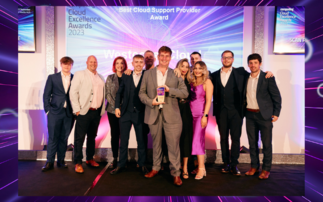
The pandemic revealed which organisations were digitally capable and mature, and forced those that weren't into transformation. Two years on, many organisations are still adapting to the new normal.
The pandemic revealed which organisations were digitally capable and mature, and forced those that weren't into transformation. Two years on, many organisations are still adapting to the new normal.
Intel's Stuart Dommett and VMWare's Spencer Pitts discussed this in Computing's recent webinar: Managing devices for today's anywhere, everywhere workforce.
Both agree that IT leaders must get value from the technology they're purchasing in a way that supports hybrid working and maintains high levels of security. But they must provide seamless, performant experiences for a workforce that now expect remote access regardless of location or time.
Users and their requirements will vary
There is no ‘one size fits all' according to Dommett and Pitts. Different personas, styles of working, job functions, and risk involved in roles will demand distinct endpoint management. IT leaders need to be granular and understanding to be aware of user requirements now and in the future. They need to balance user experience and productivity with locking devices down, ensuring security is upheld.
Cloud-based manageability is a major component of this. For Pitts and Dommett, the capability is important but, crucially, the process and experience need to be the same regardless of whether you are at home, in the office, or hybrid.
Without remote endpoint management, productivity is seriously stalled as users must travel to their office and gain in-person assistance, potentially weakening security in the process as threat exposures may be prolonged. Monitoring device health and patching issues before they cause major complications is a key aspect of remote endpoint management, preventing downtime and getting ahead of serious problems.
Remote working as a business advantage
Devices and manageability should ensure that no one is at a disadvantage, according to Dommett. Technology plays a huge role in how employees interact within their company and with each other. If users are at home and using a device that doesn't fit with their workflow or communication preferences, there is a risk of alienating people.
Employee retention is linked to user satisfaction and demonstrating to your workforce that their preferences are incorporated should not be overlooked.
For example, devices that sit outside the traditional management sphere when at home may not receive real-time updates, and upon connecting back into the network in the office will experience update delays. Pitts highlights that from the employees' points of view, these endpoint management support issues would significantly interfere with their work.
Another example Pitts gives is when onboarding new workers. If setting up a new employee with their devices takes days or weeks, not only will the worker be less productive and engaged, but they will also have a negative experience or view of the company.
The new world of work
Processes have changed during the pandemic and ongoing hybrid working. The collaboration tools that have been the backbone of continued business necessitate performant, up to date hardware and software.
Dommett emphasises that IT leaders need to think about supporting tools, he says it's vital to spec up and spec consistently. IT leaders must consider the day-to-day management or assistance their employees require, as well as the experiences they expect in a digitally transformative world.
Providing the tools and support for your workforce has never been more important. Hybrid working means companies no longer have a closed ecosystem and the security parameter has exploded, as a consequence, the tooling to understand end-to-end interactions must be appropriate.
Modernising approaches and device management to ensure efficient updating, troubleshooting, and administering of endpoint devices from afar is vital to remain competitive and productive. It is also crucial in attracting and retaining a talented and engaged workforce.
To learn about Computing's research into the endpoint manageability state of the nation, or view the webinar, visit our content hub.
This post is sponsored by Intel

















